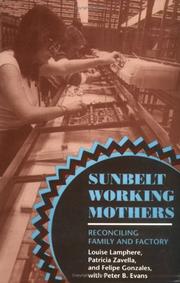| Listing 1 - 3 of 3 |
Sort by
|
Book
ISBN: 080328828X 0803288301 9780803288300 9780803288287 0803288298 9780803288294 9780803284654 0803284659 9780803288287 9780803288294 Year: 2016 Publisher: Lincoln
Abstract | Keywords | Export | Availability | Bookmark
 Loading...
Loading...Choose an application
- Reference Manager
- EndNote
- RefWorks (Direct export to RefWorks)
"Poltica offers a stunning revisionist understanding of the early political incorporation of Mexican-origin peoples into the U.S. body politic in the nineteenth century. Historical sociologist Phillip B. Gonzales reexamines the fundamental issue in New Mexico's history, namely, the dramatic shift in national identities initiated by Nuevomexicanos when their province became ruled by the United States. Gonzales providesan insightful, rigorous, and controversial interpretation of how Nuevomexicano political competition was woven into the Democratic and Republican two-party system that emerged in the United States between the 1850s and 1912, when New Mexico became a state. Drawing on newly discovered archival and primary sources, he explores how Nuevomexicanos relied on a long tradition of political engagement and a preexisting republican disposition and practice to elaborate a dual-party political system mirroring the contours of U.S. national politics. Poltica is a tour de force of political history in the nineteenth-century U.S.-Mexico borderlands that reinterprets colonization, reconstructs Euro-American and Nuevomexicano relations, and recasts the prevailing historical narrative of territorial expansion and incorporation in North American imperial history. Gonzales provides critical insights into several discrete historical processes, such as U.S. racialization and citizenship, integration and marginalization, accommodation and resistance, internal colonialism, and the long struggle for political inclusion in the borderlands, shedding light on debates taking place today over Latinos and U.S. citizenship"--
SOCIAL SCIENCE / Sociology / General. --- POLITICAL SCIENCE / History & Theory. --- HISTORY / United States / State & Local / Southwest (AZ, NM,OK, TX). --- Hispanic Americans --- Mexican Americans --- Hispanics (United States) --- Latino Americans --- Latinos (United States) --- Latinxs --- Spanish Americans in the United States --- Spanish-speaking people (United States) --- Spanish-surnamed people (United States) --- Ethnology --- Latin Americans --- Spanish Americans (Latin America) --- Chicanos --- Hispanos --- Politics and government --- Mexican-American Border Region --- New Mexico --- American-Mexican Border Region --- Border Region, American-Mexican --- Border Region, Mexican-American --- Borderlands (Mexico and U.S.) --- Mexico-United States Border Region --- Tierras Fronterizas de México-Estados Unidos --- United States-Mexico Border Region --- Historiography.
Book
ISBN: 0826362850 Year: 2021 Publisher: Santa Fe, New Mexico ; Albuquerque, New Mexico : School for Advanced Research Press : University of New Mexico Press,
Abstract | Keywords | Export | Availability | Bookmark
 Loading...
Loading...Choose an application
- Reference Manager
- EndNote
- RefWorks (Direct export to RefWorks)
"For Latinx people living in the United States, Trumpism represented a new phase in the old struggle to achieve a sense of belonging and full citizenship. Throughout their history in the United States, people of Mexican descent have been made to face the question of how they do or do not belong to the American social fabric and polity. Structural inequality, dispossession, and marginalized citizenship make up an old story for Mexican Americans, and this story is a foundational one. This volume situates a new phase of presidential politics in relation to what went before and asks what new political possibilities emerged from this dramatic chapter in our history. What role did anti-Mexicanism and attacks on Latinx people and their communities play in Trump's political rise and presidential practices? Driven by the overwhelming political urgency of the moment, the contributors to this volume seek to frame Trumpism's origins and political effects. Published in Association with School for Advanced Research Press"--
Political culture --- Mexican Americans --- Hispanic Americans --- Political activity. --- Trump, Donald, --- Influence. --- United States --- Social policy

ISBN: 1501724509 9781501724503 0801427886 9780801427886 0801480663 9780801480669 Year: 2018 Publisher: Ithaca, NY
Abstract | Keywords | Export | Availability | Bookmark
 Loading...
Loading...Choose an application
- Reference Manager
- EndNote
- RefWorks (Direct export to RefWorks)
The recession of the 1980s triggered important economic and cultural changes in the United States, and working women were at the center of these changes. Sunbelt Working Mothers compares the experiences of Mexican-American and white mothers employed in apparel and electronics factories in Albuquerque and illuminates the ways in which individual women manage the competing demands of two roles. Authors Lamphere, Zavella, Gonzales, and Evans show how these mothers-without the economic resources of highly paid professional women-find day care, divide economic contributions and household responsibilities with spouses or roommates, and obtain emotional support from kin or friends.After an overview of the recent industrialization of the Sunbelt economy, the authors consider how new participative management techniques have given greater flexibility to some women's work lives. Drawing on interviews with married couples and single mothers, they offer an engaging account of representative women's home lives, and conclude that working families are changing. This timely book will be welcomed by students and scholars in the fields of anthropology, sociology, labor studies, women's studies, and social history.
Work and family --- Working mothers --- Families and work --- Family and work --- Families --- Dual-career families --- Work-life balance --- Employed mothers --- Mothers, Employed --- Mothers, Working --- Mothers
| Listing 1 - 3 of 3 |
Sort by
|

 Search
Search Feedback
Feedback About UniCat
About UniCat  Help
Help News
News